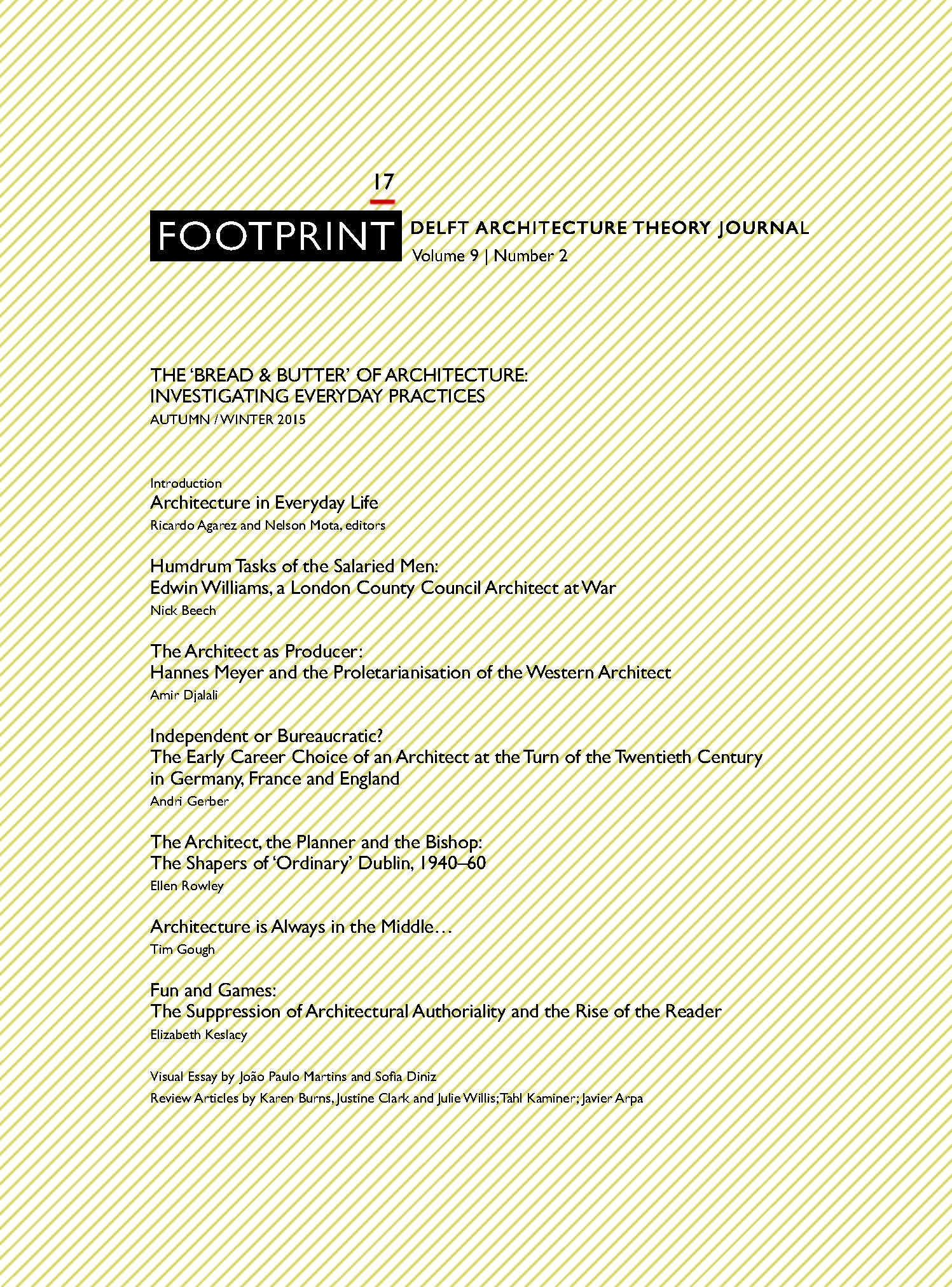The Architect as Producer: Hannes Meyer and the Proletarianisation of the Western Architect
DOI:
https://doi.org/10.7480/footprint.9.2.859Abstract
With the foundation of the Bauhaus, Walter Gropius advocated an end to the division between arts and crafts. Contrary to the idea of architecture as art, the programme of the school aimed to assimilate architecture with industry in order to satisfy collective social needs. Yet, despite this programmatic declaration, such a project was realised only after Gropius’ departure from the Bauhaus, under the controversial directorship (1927–1930) of the Swiss architect Hannes Meyer. Meyer achieved unprecedented success both in terms of academic production and financial performance. Yet his realisations were paralleled by the leftist radicalisation of the school’s politics: Meyer transformed the workshops into factory production units and the students into industrial workers. Eventually, the politicisation of the school cost Meyer his office and a negative reputation in historical records that still holds today. This article posits that Meyer achieved his success at the Bauhaus not despite his radical allegiance, but precisely because of it. The realism of Meyer’s strategy is evaluated through his capacity to anticipate many developments in the organisation of architectural production. In particular, his critique of intellectual labour in architecture is confronted with the contemporary proletarisation of architects in the Western world.
References
Aureli, Pier Vittorio. ‘Intellectual Work and Capitalist Development: Origins and Context of Manfredo Tafuri’s Critique of Architectural Ideology’. Site (2009): 26–27.
Aureli, Pier Vittorio. ‘The Theology Of Tabula Rasa: Walter Benjamin And Architecture in The Age of Precarity’. Log (Spring 2013): 27.
Awan, Nishat, Tatjana Schneider, and Jeremy Till, eds. Spatial Agency: Other Ways of Doing Architecture. London: Rutledge, 2011.
Bonfanti, Ezio, et. al., eds. Architettura Razionale. Milan: Franco Angeli, 1977.
Borra, Bernardina. ‘Hannes Meyer: Co-op Architecture’, San Rocco, 6 (2013): 97–105.
Borra, Bernardina. ‘Co-op Architecture: The Architect as Organizer, Architecture as Collective Class Consciousness’. In ‘The Architecture of Cooperation: A Project for Organizing Collective Creativity’. Unpublished PhD diss. Delft: TU Delft, 2014.
Boullée, Étienne-Louis. Architettura. Saggio sull'arte. Translated by Aldo Rossi. Padua: Marsilio, 1967.
Benjamin, Walter. ‘The Author as Producer’. New Left Review I 62 (July/August 1970): 83–96.
Berardi, Franco. The Soul at Work: From Alienation to Autonomy. New York: Semiotext(e), 2009.
Carpo, Mario. The Alphabet and the Algorithm. Cambridge, MA: The MIT Press, 2012.
Deamer, Peggy. ‘BIM and Contemporary Labor’. Pidgin 15 (2012).
Edufactory Collective. Towards a Global Autonomous University. New York: Autonomedia, 2009.
Forgács, Éva. 1995. The Bauhaus Idea and the Bauhaus Politics. Budapest: Central European University Press.
Gropius, Walter. Idee und Aufbau des Staatlichen Bauhaus. Weimar: Bauhausverlag, 1919.
Gropius, Walter. Letter to Tomàs Maldonado from 24 November 1964. Ulm 9 (10): 70.
Hannes-Meyer-Geburtstagskomitee, ed. Hannes Meyer - Beiträge zum 100. Geburtstag. Internationales Symposium. Weimar: Hochschule für Architektur und Bauwesen, 1990.
Jamieson, Claire, ed. The Future for Architects?. London: RIBA (Royal Institute of British Architects), 2009. http://buildingfutures.org.uk.
Kieren, Martin. Hannes Meyer: Dokumente zur Frühzeit, Architektur- und Gestaltungsversuche 1919–1927. Teufen: Verlag Arthur Niggli AG, 1990.
Kleinerüschkamp, Werner, ed. Hannes Meyer 1889 - 1954: Architekt, Urbanist, Lehrer. Berlin: Bauhaus-Arkiv, 1989.
Kockelkorn, Anne and Axel Sowa. ‘Zurich, 1971: A Conversation on the Housing Question, Academic Intrigue, and an Italian Maestro. Conversation with Bruno Reichlin and Jörn Janssen’. Candide 7 (October 2013): 113–140.
Lazzarato, Maurizio. The Making of the Indebted Man: Essay on the Neoliberal Condition. New York: Semiotext(e), 2012.
Maldonado, Tomàs. ‘Is the Bauhaus Relevant Today?’ Ulm 8 (September 1963): 5–13.
Meyer, Hannes. Architettura o Rivoluzione. Edited by Francesco Dal Co. Padua: Marsilio, 1969.
Meyer, Hannes. ‘Bauen und Gesellschaft. Schriften, Briefe, Projekte’. Edited by Lena Meyer-Bergnen and Klaus-Jürgen Winkler. Dresden: VEB Verlag der Kunst, 1980.
Miessen, Markus, and Shumon Basar, eds. Did Someone Say Participate?: An Atlas of Spatial Practices. Cambridge, MA: The MIT Press, 2006.
Nerdinger, Winfried. ‘Hannes Meyer e il “rosso sconveniente”’. Casabella 565 (1990): 30–35.
Ockman, Joan. ‘Theory and Practice’, Assemblage 41 (April 2000): 51.
Pasquinelli, Matteo. ‘The so-called Italian Theory and the Revolt of Living Knowledge’. Uninomade (April 2001). http://www.uninomade.org/italian-theory-en/.
Poerschke, Ute. ‘Hannes Meyer: Connecting Poetics and Ethics’. Proceedings of the Conference Reconciling Poetics and Ethics in Architecture, held at the Canadian Centre for Architecture CCA and McGill University, Montreal, 2007.
Powerhouse Company, ed. Rien ne va plus: Texts on the economic crisis and its intricate relation to architecture. Maastricht: NAiM / Bureau Europa, 2009.
Saint, Andrew. The Image of the Architect. New Haven and London: Yale University Press, 1983.
Schnaidt, Claude. Hannes Meyer: Buildings, Projects and Writings. Teufen: Verlag Arthur Niggli AG, 1965.
Somol, Robert E. and Sarah Whiting. ‘Notes Around the Doppler Effect and Other Moods of Modernism’. Perspecta 33: Mining Autonomy, 72-77 (Cambridge, MA: The MIT Press), 2002.
Speaks, Michael. ‘Design Intelligence and the New Economy’. Architectural Record 190 (January 2002): 72–76.
Speaks, Michael. ‘After Theory’, Architectural Record 193 (June 2005): 72–75.
Wingler, Hans M. Bauhaus: Weimar, Dessau, Berlin, Chicago. Cambridge, MA: The MIT Press, 1978.
Winkler, Klaus-Jürgen. Dear Architekt hannes meyer: Anschauungen un Werk. Berlin: VEB Verlag für Bauwesen, 1989.
Downloads
Published
Issue
Section
License
- Authors retain copyright and grant the journal right of first publication with the work simultaneously licensed under a Creative Commons Attribution License that allows others to share the work with an acknowledgement of the work's authorship and initial publication in this journal.
- Authors are able to enter into separate, additional contractual arrangements for the non-exclusive distribution of the journal's published version of the work (e.g., post it to an institutional repository or publish it in a book), with an acknowledgement of its initial publication in this journal.





